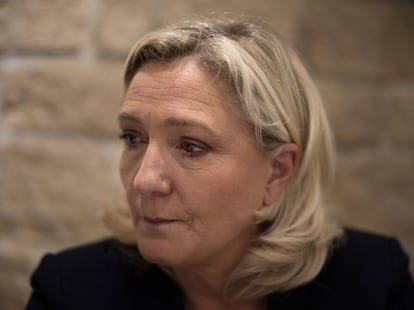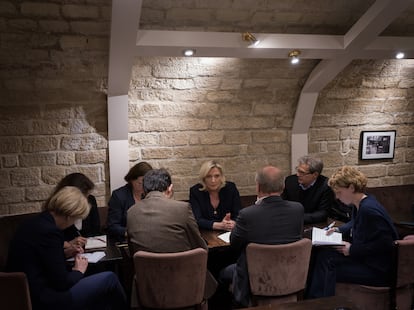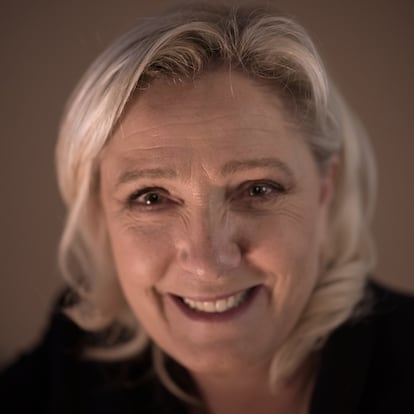Marine Le Pen: ‘If Russia wins the war, it will be catastrophic... if Ukraine wins, it will mean WWIII has been unleashed’
The leader of the National Rally, once rejected as a far right pariah, feels closer than ever to the French presidency. Has the pension reform crisis given wings to her movement, based on nationalism and rejection of immigration?

“If I were president...” Marine Le Pen begins. Then she immediately corrects herself: “When I am president...” Unrest in France over the government’s pension reform has reinforced the chances of an election victory for the leader of the National Rally (RN), heir to the far-right party founded half a century ago by her father, Jean-Marie Le Pen. If Marine Le Pen were to face the incumbent Emmanuel Macron in a presidential runoff vote today, she would win with 55% of the ballots compared to 45% for the current president, according to a poll by the Elabe institute. At the last presidential election, in 2022, Macron prevailed with 58% support compared to 42% for Le Pen. Since last June, the RN has been the leading opposition group in the National Assembly, with 89 lawmakers who always wear ties ― the men, at least ― and who make a point of trying to avoid stridency, if not always successfully.
“We are reaping what we have sown,” said Le Pen, 54, in an interview held on Tuesday with several European correspondents from the LENA media alliance, including EL PAÍS. The gathering took place at a café near the National Assembly. “During the presidential campaign we planted an extremely serious, detailed project in which we anticipated problems that a year later turned out to be true. Based on this credit, and at the same time thanks to our respect for the functioning of the institutions, we have increasingly managed to earn the trust of the French people.”
Although the elections are four years away, Le Pen feels closer than ever to power. She believes that since she took over the reins of the party from her father in 2011, she has managed to un-demonize it. That is to say, to take it out of the corner reserved for ideological pariahs and make it acceptable to a good portion of the French population.
“In just a few years, we have gone from being the most-hated party in France to the most-beloved party in France,” says the leader of Europe’s largest far-right party, a description that she rejects. “We have never been on the far right,” she argues, because she is radically opposed to several principles that she considers characteristic of the extreme right, such as a rejection of the parliamentary system and of pluralism, and the use of violence. Le Pen goes even further: “We are not right-wing.” What is the RN, then? “I would say that we are national,” she replies. “We consider the nation to be the political heart of our project.”
And yet, the fundamentals of Le Pen and the RN have not changed. One is nationalism, and this is the reason why she she applauds Macron for distancing himself from the United States with respect to China, yet criticizes him for doing so in the name of European sovereignty: “For there to be sovereignty, a people is necessary, and there is no such thing as a European people.” Le Pen will not follow the path of another leader from her ideological sphere, Italian Prime Minister Giorgia Meloni, who assumed power on a pro-NATO and pro-EU message. “I am still a euroskeptic and every day that passes I am more so. Not skeptical about Europe, but about the political organization of Europe.”
When reminded of her former affinity with Russian President Vladimir Putin, she denies it with a smile: “You have the right to say it, but...” A few minutes later, upon hearing that she is “more of a Russophile,” she reacts: “I can’t let that be said about me.”
Le Pen has for years been the French politician most-closely aligned to Putin’s Russia. Her party received a €9 million loan from a Russian bank in 2014 and she declared that she shared Putin’s global vision. After the invasion of Ukraine in February 2022, she has distanced herself and now declares: “I believe in the sovereignty of nations: if Ukraine wants to join NATO, if it is their will, I don’t see who can oppose it.”
“When a nation like Russia attacks another nation and threatens its sovereignty, there is no possible equidistance, you have to take a stand,” she adds, declaring herself in favor of sending defensive weapons to Ukraine, yet opposing offensive ones. Does she support sanctions? Yes, but not to the energy sector. So what is her proposed solution to the conflict? Negotiating peace. Now.
“If Russia wins the war, it will be catastrophic because all countries with a territorial conflict will think that they can solve it with weapons,” she says. “If Ukraine wins, it will mean that NATO has entered the war, because I am convinced that Ukraine, without the power of NATO, cannot militarily defeat Russia. And this means that World War III has been unleashed.” Third option: “If we continue to slowly deliver weapons to Ukraine, as we are doing now, then we are facing a new Hundred Years’ War [a long-running medieval conflict between England and France], which, considering the human losses, is a terrible drama.” Pressed to specify how she would resolve the conflict, Le Pen retorts: “I’m not going to give you a peace plan right here, on a coffee table.”

The other invariable foundation of RN is a rejection of immigration, and on this topic Le Pen congratulates herself for having achieved “a total ideological victory” because, in her opinion, other parties have come around and adopted her ideas. “Today, even the Communist Party says that borders are needed,” she notes. But Le Pen does not stop at defending border control. She has promised that if she reaches power, she will organize a referendum to introduce into the Constitution a so-called national preference, which would give priority to French citizens over foreigners in access to jobs, housing and social benefits.
“For me, referendums must be an integral part of the functioning of French democracy. What I contemplate is to hold at least one big referendum per year,” she says.
Like other national-populists, Le Pen makes a banner out of the concepts of voting and democracy. She is critical of the legislative procedure that Macron used to adopt the pension reform, without a vote in the National Assembly, although the government later survived two no-confidence votes, one tabled by Le Pen’s RN.
“How do you want people not to feel that there is a democratic problem?” she says. “Emmanuel Macron is the growth hormone of those who no longer believe in democracy.”
Regarding the risk of an authoritarian drift if she comes to power, she replies: “On the contrary, if I get elected there will be more democracy.” And she cites the referendums, election by proportional representation and her desire to give parliament a greater role. “How can I prove to you that I will not be authoritarian? It is a perverse accusation. I have always been on the side of freedoms.”

Le Pen considers herself the victim of a caricature, but says that this has ended up benefiting her. “Our lawmakers were spoken of as if they were cretins, useless, incompetent. It was so insulting that, when the French people saw intelligent, hard-working, well-dressed deputies show up instead, they said to themselves: ‘These people are a far cry from the portrait they have painted of them.’” The RN leader maintains that if her party reaches power, “people will see that not only is it not the apocalypse, but that it is a policy of common sense.”
Marine Le Pen does not deny the past, nor the legacy of Jean-Marie Le Pen, a totem of the most unapologetic far right, openly associated with anti-Semitism and xenophobia. “I think it is honorable not to make a selection between what was less glorious and what was more glorious,” she says. As for her father, whom she expelled from the party, the two have since reconciled. “He is 95 years old, and happily my relationship with him has calmed down. We don’t talk about politics anymore, so we get less angry.”
Sign up for our weekly newsletter to get more English-language news coverage from EL PAÍS USA Edition
Tu suscripción se está usando en otro dispositivo
¿Quieres añadir otro usuario a tu suscripción?
Si continúas leyendo en este dispositivo, no se podrá leer en el otro.
FlechaTu suscripción se está usando en otro dispositivo y solo puedes acceder a EL PAÍS desde un dispositivo a la vez.
Si quieres compartir tu cuenta, cambia tu suscripción a la modalidad Premium, así podrás añadir otro usuario. Cada uno accederá con su propia cuenta de email, lo que os permitirá personalizar vuestra experiencia en EL PAÍS.
¿Tienes una suscripción de empresa? Accede aquí para contratar más cuentas.
En el caso de no saber quién está usando tu cuenta, te recomendamos cambiar tu contraseña aquí.
Si decides continuar compartiendo tu cuenta, este mensaje se mostrará en tu dispositivo y en el de la otra persona que está usando tu cuenta de forma indefinida, afectando a tu experiencia de lectura. Puedes consultar aquí los términos y condiciones de la suscripción digital.









































